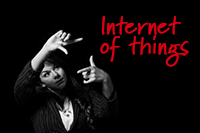In the second of a two-part series, Lucas Pinz, senior technology manager, PromonLogicalis, looks at how the Internet of Things will transform the ICT industry – and assesses the challenges that must still be overcome if the opportunities inherent in a new, hyper-connected world are to be realised.
To date, the commercial internet has essentially moved through three phases of evolution:
- In phase 1, connectivity was all that mattered. We wanted to browse the web and read e-mails.
- In phase 2, e-business emerged, moving billions of dollars worldwide, and new modes of collaboration changed the way companies do business.
- We entered phase 3 quite recently, with the arrival of immersive experiences. This era of Facebook, mobility, cloud and intensive video experience has changed the way people and business interact.
Already it seems, phase 4 is upon us. As I pointed out in the first post in this series, we are entering the era of The Internet of Things (IoT): an era in which people, processes, data and things are connected.
In practice, this means that people will be connected in more relevant and valued ways, video experiences will be intensified, information and people (or machines) will be more accurately and usefully connected, and all this data will be organised and analysed in order to be more useful in decision making.
Big change, big opportunity
Make no mistake: The Internet of Things will transform the ITC industry and our way of life. The sheer scale of change tells its own story. By 2020, 50 billion devices will be connected to the Internet, creating a market worth US$ 19 trillion according to Cisco – that is almost eight times the GDP of Brazil.
Why now? Because everything is migrating to IP. Take a look around. Your TV, videogame console, alarm, car, it’s all connected. Every day, new devices and applications emerge, devices with increasingly greater processing capacity. And we’re living in a moment when innovation, productivity and collaboration are crucial to business. The Internet of Things will power innovation and productivity by transforming connections and collaboration between employees and systems.
Big challenges too
However, if we are to reap all benefits offered by the Internet of Things, a number of challenges must be overcome:
- Connectivity: it is pointless to talk about the Internet of Things if we don’t have internet access. How can agriculture leverage IoT if high speed standards for mobile, such as LTE, are not implemented in rural areas?
- IPv6: each device needs its own unique identifier, and with the existing stock of IPv4 addresses fast running out, the slow uptake by countries all across the globe of this new protocol could well be a threat to the development of the IoT
- Security: we are already hearing about the first cases of attack coming from IoT. The other day, I read in the newspaper that someone hacked into a baby monitor and screamed at a sleeping baby.
- Job creation: when we say that there won’t be any more need for professionals to measure energy consumption in our homes, what will happen to those jobs? There will be, however, an increasing need for specialisation and knowledge.
- Business impacts: new products, business models and consumption patterns will emerge, but we are still not able to predict how the Internet of Thing will impact business.
The truth is that these two final points are the most important. The technology challenges will be overcome but, even though the age of the Internet of Things is almost upon us, we are not prepared. All we can say for sure is that IoT will transform the way we live, the way we relate in society and the way we produce value – but we do not, as yet, know how we will harness that change for the benefit of business and society.
These are big, big changes, so the time to start getting ready is now.

